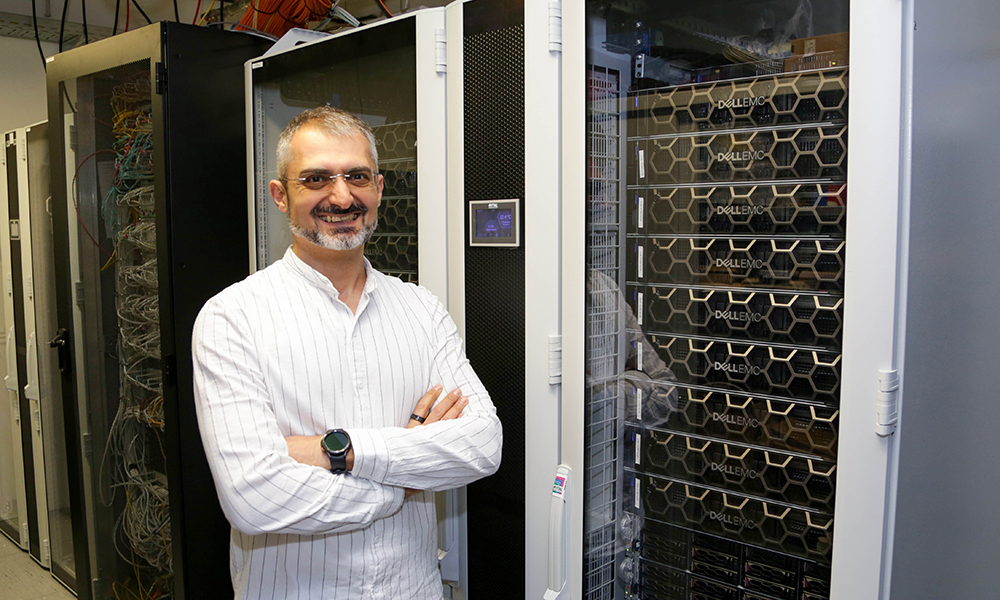
We are EMBL: Eduard Avetisyan on the role of IT in structural biology
Head of EMBL Hamburg’s IT team explains how IT supports the site’s structural biology research, and what are the joys and challenges of this work

EMBL Hamburg’s IT Team plays a crucial role in supporting the site’s research efforts. Besides providing the full spectrum of general IT services, EMBL Hamburg’s IT Team also enables the storage and computational analysis of large amounts of crystallography and cryo-EM data. Furthermore, the team is essential for implementing the EMBL sustainability strategy at the Hamburg site; for years, they have been striving to optimise server operations to minimise energy consumption.
This multifaceted team is led by Eduard Avetisyan, a former particle physicist with a PhD in the field. He joined EMBL a few years ago after transitioning from research to IT. Until recently, he was also a member of the Staff Association Committee. Here, he shares his insights on the joys and challenges of leading the IT department at EMBL Hamburg.
What do you think is the most exciting thing about your work?
It’s often said that IT services are like air – usually you don’t notice them, but without them, your work would suffocate. It’s very satisfying to see the day-to-day impact of your work, see new things becoming possible or old things getting better, and receiving appreciation from colleagues.
With time, I have also noticed that people tend to approach me with all kinds of general questions regarding life in Germany and Hamburg, so when I was nominated to join the Staff Association Committee, I didn’t hesitate much. In the Staff Association, I gained further knowledge of how things work in the lab, created new interesting connections, and took advantage of opportunities to make changes where needed.
How do you see your work evolving over the next few years?
Providing computational resources for structural biology is quite challenging – the field is rather dynamic, and there is an ever-growing need for higher throughputs, larger data volumes, new types of platforms for sophisticated calculations, and support for the newest as well as legacy software.
There are a lot of changes coming up, both locally in our team and globally with respect to consolidation of all EMBL sites from the IT perspective. We will have more exchange, both personal and work-related, with our colleagues in other sites, and create new, more harmonic, and optimal solutions for our users, strengthening the feeling of belonging to a larger whole.
How can other staff get involved in your work?
All staff is always involved in my work, automatically 🙂 We are in permanent contact with all staff, from trainees to the Head of site, using all communication channels. We ask, we listen, and we change things based on their feedback. It’s a constant involvement!
Do you organise any training related to IT?
Yes, we do semi-regular IT seminars to highlight the news and developments in the field and keep the staff at our site up-to-date. The team members also receive dedicated training every year to further enhance their skills or learn new technologies.
What’s the best part of working at EMBL?
Without any doubt – the people. It’s an amazing community of very diverse individuals, each with their own background and from different countries, embracing the opportunity of working together in this amazing environment. This is a treasure that’s hard to overestimate.
When I joined EMBL, I felt captivated by the work and life atmosphere. The decision-making process was creative and pragmatic. It was also quite obvious that the contribution from each and every member of EMBL is crucial for its success – that was very motivating! It was never boring for me – even after leaving science, as the opportunities to apply my skills and gain new ones seemed endless.
What do you do in your spare time?
I like playing and spending time with my kids, watching movies, trying to learn to play a musical instrument, stargazing, and playing badminton. Lately, cooking and baking have become serious hobbies as well!
If you could have coffee with three famous scientists who would they be, and why?
Neil deGrasse Tyson (very knowledgeable yet highly entertaining), Maria Skłodowska-Curie (revolutionary discoverer, but also for her fight against discrimination and stereotypes), and Isaac Newton (probably humanity’s brightest intellect so far).
What is the book or movie you are most likely to recommend to people you meet?
The book ‘Hard to be a God’ by the Strugatsky brothers, emphasising how difficult it is to remain human when super-powers are at hand. I also found the fantastic comedy mini-series ‘Good Omens’ (based on the book of the same name by Terry Pratchett and Neil Gaiman) very enjoyable, yet educative – it pretty much focuses on humans being fundamentally human (rather than good or evil).
At what age did you decide you wanted to be a scientist, and what triggered that?
I come from a family of scientists back in Armenia, so I guess there was no explicit decision happening, it was mutually assumed. I’ve heard the same statement from people growing up in medical, artistic families etc., so I guess it’s not so unusual 🙂


